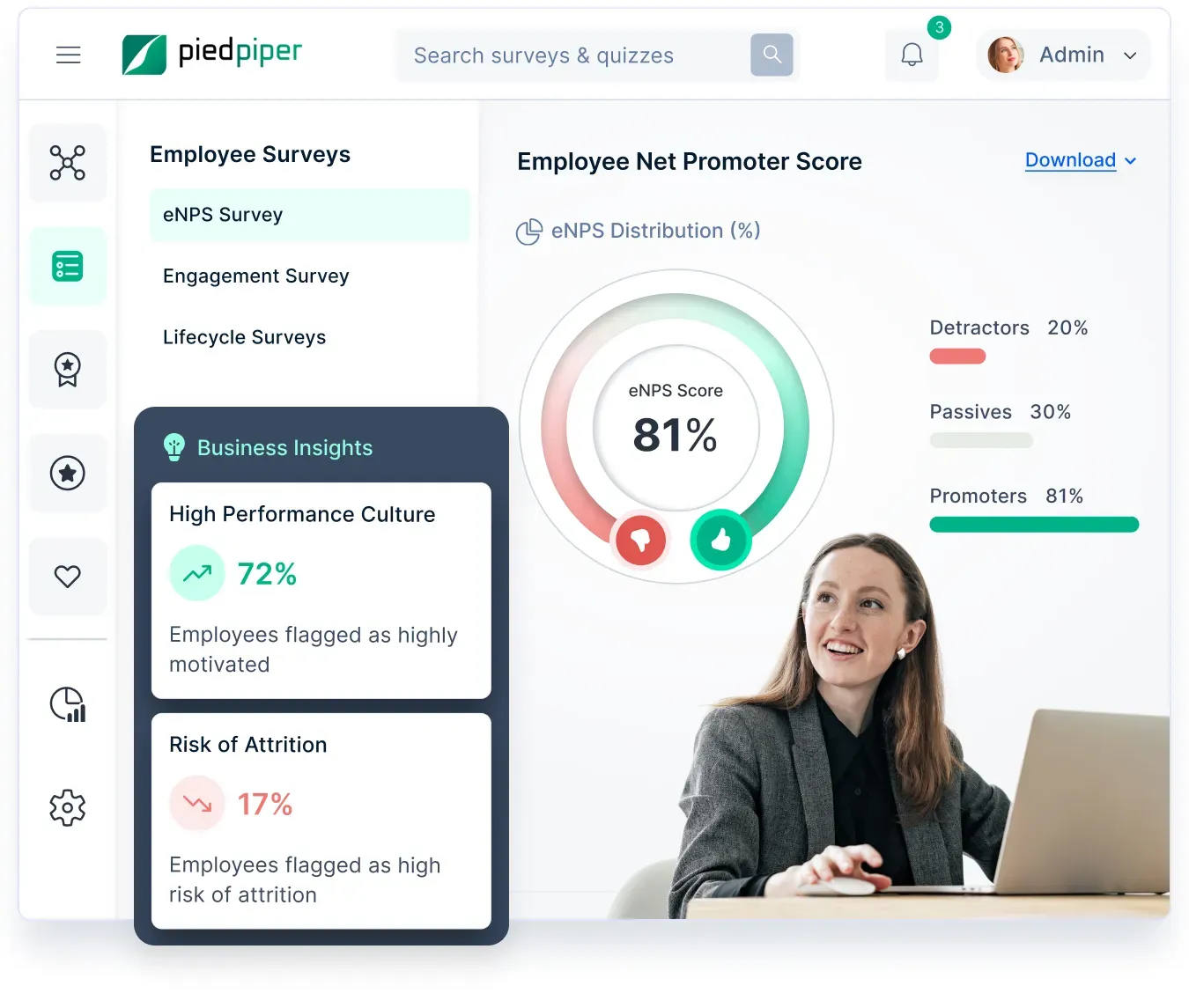34 Fragen zur Selbsteinschätzung für Mitarbeiter zur Leistungsverbesserung
elf-evaluation is a powerful tool for employees to reflect on their performance, identify strengths, and set career goals. This guide provides 50 self-evaluation questions to help employees take ownership of their growth and for employers to improve feedback and development processes.
Auf dieser Seite
- Was sind Fragen zur Selbsteinschätzung?
- Why employee self-evaluation surveys are important
- 34 Fragen zur Selbsteinschätzung der Mitarbeiter
- Tipps für eine aussagekräftigere Selbstevaluierung
- Was ist zu tun, um die Mängel zu beheben?
- Enhance employee self-evaluations with Empuls
- Die wichtigsten Erkenntnisse
Performance reviews play a key role in aligning employee efforts with company goals. Self-evaluation questions for employees encourage active engagement, accountability, and personal growth, making performance assessments more effective.
A self-evaluation questionnaire for employees allows them to reflect on their work, assess strengths and weaknesses, and set future goals. It also gives employers insights into training needs, employee satisfaction, and workplace challenges.
In this blog, we will cover questions for employee self-evaluation that help employees review their performance, identify areas for improvement, and take charge of their professional development. Whether you're an employee seeking growth or an employer aiming to support your team, these self-evaluation questions can be a powerful tool for success.
Was sind Fragen zur Selbsteinschätzung?
Self-evaluation questions are prompts designed to help employees assess their workplace performance, skills, and contributions. These questions encourage individuals to reflect on their achievements, challenges, and areas for improvement, fostering a sense of accountability and personal growth.
A self-evaluation questionnaire for employees typically includes questions about job performance, goal-setting, collaboration, and professional development. By answering these questions, employees understand their strengths better, identify skills they need to improve, and take ownership of their career progression.
Employers also benefit from questions for employee self-evaluation, as they provide valuable insights into employee satisfaction, engagement, and training needs, helping organizations create a more supportive and growth-oriented work environment.
Why employee self-evaluation surveys are important
Employee self-evaluation surveys play a crucial role in performance management, professional development, and workplace engagement. They allow employees to reflect on their strengths, areas for improvement, and career goals, fostering a sense of accountability and ownership over their progress.
- Encourages self-awareness and growth: Self-evaluation surveys help employees assess their achievements, challenges, and areas for development, allowing them to take an active role in their career progression.
- Improves communication between employees and managers: These surveys create opportunities for meaningful discussions about performance expectations, career aspirations, and feedback, strengthening manager-employee relationships.
- Aligns individual goals with company objectives: Employees better understand how their contributions impact the organization, ensuring their efforts are aligned with business goals and expectations.
- Identifies training and development needs: Employers can use self-evaluation insights to pinpoint skill gaps, offer targeted training programs, and support employees in their professional growth.
- Boosts engagement and job satisfaction: When employees feel heard and involved in their development, they are more engaged, motivated, and satisfied with their roles, reducing turnover.
By integrating self-evaluation questionnaires for employees into performance reviews, organizations can empower employees, enhance feedback processes, and create a culture of continuous improvement.
34 Fragen zur Selbsteinschätzung der Mitarbeiter
Sie können die folgenden Arten von Fragen zur Selbsteinschätzung in eine Mitarbeiter-Selbsteinschätzung aufnehmen:
Employee self-evaluation questions regarding the job
These questions are intended to help the employee in reviewing specific parts of their own work:
1. Werfen Sie einen Blick auf Ihre Stellenbeschreibung. Gibt es Aufgaben, für die Sie mehr Zeit benötigen oder die Sie nicht mehr ausführen?
2. Beschreiben Sie die Aufgaben, die Sie seit Ihrer letzten Leistungsbeurteilung übernommen haben, oder die Schwierigkeiten, denen Sie begegnet sind.
3. Was gefällt Ihnen an Ihrer derzeitigen Tätigkeit am besten?
4. Welche Elemente Ihres Arbeitsverhältnisses würden Sie am liebsten ändern oder abschaffen, und warum?
Employee self evaluation questions regarding performance
Diese Fragen sollen den Arbeitnehmern helfen, ihre Leistungen am Arbeitsplatz zu beurteilen:
5. Was waren Ihre wichtigsten Ziele für die Stelle, und wie gut haben Sie diese Ihrer Meinung nach erreicht?
6. Welche drei Dinge haben Sie in den letzten drei Monaten erfolgreich abgeschlossen? Warum glauben Sie, dass Ihre Bemühungen erfolgreich waren?
7. Wo, glauben Sie, wären Ihre Fähigkeiten am wertvollsten? Gibt es bestimmte Regionen oder Projekte?
8. Nennen Sie ein Beispiel für eine schwierige Situation, die Sie gut gemeistert haben, und heben Sie Ihre Fähigkeiten und den Weg dorthin hervor.
9. Wie würden Sie Ihre Leistung seit dem letzten Gespräch mit Ihrem Vorgesetzten bewerten? Warum schätzen Sie sich selbst so hoch ein?
10. Was haben Sie in letzter Zeit, d. h. in den letzten drei bis sechs Monaten, erreicht?
11. Welche Ziele aus Ihrer letzten Bewertung hätten Sie gerne erreicht, haben es aber nicht?
12. Anything that may have supported you in achieving those objectives? If so, what?
13. Welche Aufgaben nehmen Sie wahr, die nicht zu Ihrer derzeitigen Position gehören?
14. Welche Ziele, die für Ihre Position relevant sind, wollen Sie im nächsten Beurteilungszeitraum erreichen?
15. Welche Maßnahmen kann Ihr Chef ergreifen, um Sie bei der Erreichung dieser Ziele zu unterstützen?
16. Was kann das Unternehmen tun, um Sie bei der Erreichung Ihrer Ziele zu unterstützen?
Employee self-evaluation questions regarding professional development
Diese Fragen sollen die Mitarbeiter dazu bringen, sich Gedanken darüber zu machen, wo sie sich beruflich weiterentwickeln wollen.
17. Was sind einige Beispiele dafür, wie sich Ihre berufliche Entwicklung während des letzten Beurteilungszeitraums entwickelt hat?
18. Was glauben Sie, wie viel Zeit und Geld Sie für Ihre eigene berufliche Entwicklung aufwenden? Bitte begründen Sie Ihre Entscheidung.
19. Welche beruflichen oder laufbahnbezogenen Ziele wollen Sie in den nächsten drei Jahren erreichen?
20. Welche Hilfsmittel und Unterstützung kann das Unternehmen Ihnen anbieten, um diese Ziele zu erreichen?
21. Welche beruflichen Ziele könnten Sie sich setzen, um Ihren Erfolg in Ihrer derzeitigen Position zu steigern?
22. Welche besonderen Fähigkeiten erhoffen Sie sich für den kommenden Beurteilungszeitraum zu erwerben?
Employee self-evaluation questions to encourage growth
23. Diese Fragen sollen die persönliche Verantwortung und Entwicklung fördern:
24. Haben Sie Ihr Bestes gegeben? Wenn nicht, warum dann?
25. Did you hold yourself to a high level and do so? If not, then wny?
26. Glauben Sie, dass Sie die nötige Zeit aufwenden, um qualitativ hochwertige Arbeit zu leisten?
27. Haben Sie es geschafft, Ihre Projekte trotz Ablenkungen und Aufschieberei zu beenden?
28. Did you utilize the people, tools, resources, and other things that were at your disposal to help you achieve in your position to the fullest extent possible?
29. Haben Sie Fragen gestellt, als Sie Hilfe benötigten?
30. Haben Sie Ihre Arbeit ständig auf Fehler überprüft?
31. Haben Sie die empfohlenen Verfahren für die Durchführung Ihrer Arbeit überprüft?
32. Sind Sie mit dem Ergebnis zufrieden? Werden Sie es anderen vorführen?
Employee self-evaluation questions regarding behavior and values
Diese Fragen sollen den Mitarbeiter dabei unterstützen, zu überlegen, wie seine Leistung im Vergleich zu den Werten des Unternehmens steht:
33. Glauben Sie, dass Sie die Werte des Unternehmens vertreten? Welche Werte, wenn überhaupt?
34. Sind Sie Ihren Verpflichtungen bei der Arbeit stets nachgekommen?

Find the Right Survey Template with Empuls
Make employee feedback and performance reviews easier with custom survey templates from Empuls. Choose from self-evaluation, engagement, and performance assessment surveys to gather meaningful insights quickly.
Tipps für eine aussagekräftigere Selbstevaluierung
Im Folgenden finden Sie einige Ideen, wie Sie die Aussagekraft der Selbsteinschätzung Ihrer Mitarbeiter verbessern können:
1. Konzentrieren Sie sich auf Ihren langfristigen Karriereplan
Your self-evaluation should focus on your professional growth and long-term career strategy, even though it is primarily about your current work.
Consider where you want your career to go professionally before assessing your talents and, if necessary, certifications that would help you get there. You should speak with your boss about your professional development throughout the review process and establish measurable goals.
2. Aufrechterhaltung eines ständigen Dialogs
The first stage in planning your career is to identify your goals. However, you should also utilise self-evaluation to start a constant conversation with your boss about how your career path fits within the company.
For instance, you may ask your boss what the company's top objectives are and whether there is anything in particular you should be concentrating on. You could also want to inquire with your boss to see if you can do anything to facilitate their work.
3. Optimistisch sein
With only a tiny percentage devoted to areas you may improve upon or further develop, most of your self-evaluation should consist of complimentary remarks. You also have to include a strategy for how you want to advance in those areas over the following review period in that section.
The review should center entirely on your performance, accomplishments, and professional advancement.
4. Fragen Sie nach der Verwendung der Bewertungen.
It's crucial to inquire about the company's utilization of self-evaluations during the employee assessment process. You should, for instance, ascertain if they are related to bonuses or promotions and with whom they will be shared. This can aid in your comprehension of the evaluation's tone and the necessary degree of information.
Was ist zu tun, um die Mängel zu beheben?
As was already indicated, you should devote a small amount of your self-evaluation to pinpointing areas where you may enhance your performance. The actions you should do to improve your performance in those areas are as follows:
1. Ausbildung anfordern
You should present a detailed strategy for developing after describing the areas where you need to grow to perform better in your work or advance professionally. Decide on the exact training—a training course or going to a conference—that will enhance your professional development.
You should bring up the training with your management when you review your assessment and discuss the following actions you want to take.
2. Coaching und Anleitung anfordern
Establishing a regular meeting time with your boss for assistance, further input, or mentorship is a fantastic approach to keeping the lines of communication open after your review. Talk to your management about scheduling a monthly performance review meeting.
This will show them that you are proactive in enhancing your performance at work and offer frequent accountability and feedback, both of which may significantly affect your performance.
Enhance employee self-evaluations with Empuls

Effective self-evaluation surveys require the right tools to collect feedback, analyze insights, and take meaningful action. Empuls simplifies this process with customizable self-evaluation templates, automated feedback collection, and AI-driven analytics to help organizations foster a culture of continuous improvement.
With Empuls, organizations can:
- Use ready-made self-evaluation survey templates to streamline performance reviews.
- Collect structured feedback from employees for better insights.
- Enable managers to make data-driven decisions for employee development.
- Foster open communication and professional growth in the workplace.
Empuls makes self-evaluation easy with automated surveys and real-time analytics. Empower employees to reflect, grow, and contribute meaningfully to your organization. Connect with our experts now.
Die wichtigsten Erkenntnisse
Employee self-evaluation is a valuable tool for personal and professional development. By reflecting on your work, skills, and performance, you can identify areas where you excel and need improvement. By setting goals for the future, you can take ownership of your professional development and work towards achieving your career objectives.
The employee self-evaluation questions we've provided are just a starting point. As you complete your self-evaluation, consider adding additional questions specific to your job or workplace.
Also, don't be afraid to share your self-evaluation with your employer. By providing honest and constructive feedback, you can help your employer identify areas where they can provide additional support or training.













